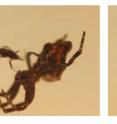Male orb-weaving spiders cannibalized by females may be choosy about mating
In a colonial orb-weaving spider, Cyrtophora citricola, females often eat the males after mating, but it is often the males that choose their mates, according a study published June 1, 2016 in the open-access journal PLOS ONE by Eric Yip from Ben-Gurion University of the Negev, Israel, and colleagues. Choosing a high quality mate can confer advantages on an animal's offspring. Due to the relatively low abundance of eggs compared to sperm, the choice is often made by females, while males attempt to increase their number of offspring by mating promiscuously. However, this may be different in species that exhibit sexual cannibalism, like the group-living C. citricola spider, where males are often eaten after mating and so may be "choosier" due to a single mate choice. The authors of the present study investigated how sexual cannibalism may promote male choosiness by pairing captured virgin male and female orb-weaving spiders randomly in the laboratory and observing which sex was more selective and which mates were selected.
The researchers found that males were choosier than females and were twice as likely to mate with well-fed females, which may be a proxy for fertility. Females ate more than 80% of their mates. The authors suggest that cannibalism by females may therefore act to promote the evolution of mate choice by males.
Eric Yip notes: "With over 80% of males cannibalized after their first copulation, males need to make their one shot at paternity count. In a colony, males are likely to encounter multiple receptive females, and we found that males prefer to court and mate with younger, fatter, and therefore potentially more fecund females."
Source: PLOS
Other sources
- Male orb-weaving spiders cannibalized by females may be choosy about matingfrom Science DailyThu, 2 Jun 2016, 2:01:01 UTC
- Male orb-weaving spiders cannibalized by females may be choosy about matingfrom PhysorgWed, 1 Jun 2016, 18:21:35 UTC
- Colonial Spiders Caught Mating - Female Eats Male Afterwards | Videofrom Live ScienceWed, 1 Jun 2016, 18:21:07 UTC
- Male Orb-Web Spiders Are Choosy About Their Cannibal Matefrom Live ScienceWed, 1 Jun 2016, 18:21:05 UTC
- Do female birds mate with multiple males to protect their young?from Science DailyMon, 30 May 2016, 16:40:58 UTC
- Do female birds mate with multiple males to protect their young?from PhysorgMon, 30 May 2016, 12:01:03 UTC
